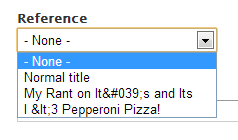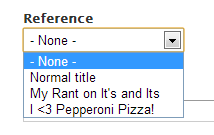Submitted by Corey Pennycuff on


Double Encoding Issue
Building complex websites with Drupal will undoubtedly require you to use the Entity Reference module. Overall, this is a great module with a lot of power and flexibility. It does have one fault, however, and that is that Entity titles are double-encoded when being shown in select boxes, as you can see here. This is nothing more than a small annoyance for experienced users, but show this to a customer and they will swear that something is broken!
As it turns out, this is a known problem, and at the time of this writing no general solution has been developed, due to issues beyond the scope of this short blog post. I'm just going to tell you how to fix it for yourself! All that is needed is a simple hook_form_alter() that will cycle through the options and remove the extra encoding, as demonstrated here in our ficticious misc module.
The Code
function misc_form_alter(&$form, &$form_state, $form_id) { $to_fix = array('field_reference'); foreach($to_fix as $fix) { if (isset($form[$fix]) && isset($form[$fix][$form[$fix]['#language']]['#options'])) { foreach($form[$fix][$form[$fix]['#language']]['#options'] as &$text) { $text = decode_entities($text); } } } }

Double Encoding Fixed
In this example, we are correcting a field named field_reference, but you can replace this with the name of any field that you have. You can also add as many additional fields to the array() declaration as you need. The result is clearly demonstrated in the picture, and the benefit to users in readability and less confusion is worth its proverbial weight in gold.
Explanation
Even though Drupal 7 allows us to have targeted form_alter()'s, I prefer to have a single location for this type of code. It is fast and will add almost no overhead to your form creation. It is also useful if you reuse fields in different entity types, as this single instance will catch all of those instances without requiring any additional codeing from you. For each field name in the array, we simply loop through its options and run the option text through decode_entities().
Caveat
If you use this method, there are a few things you should watch out for. If, in the future, this defect is fixed, then you may need to remove the code, else there could be a security issue. Also, this code only works for fields in the first level of the form. If you have fields buried deeper in the form array, then you need to account for that added depth in the code. Other than these two points, this method is safe, and has been useful in quite a number of projects.
